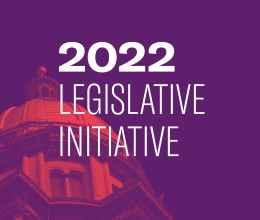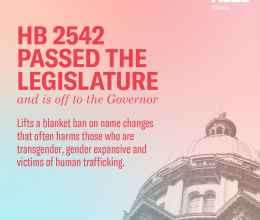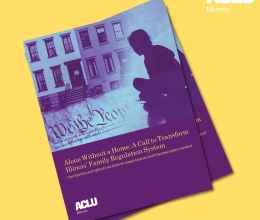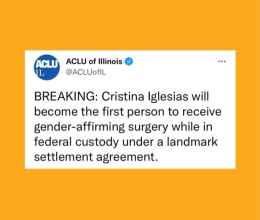By Ghirlandi Guidetti, Staff Attorney
Too many LGBTQ youth find themselves in the custody of the Illinois Department of Children and Family Services (DCFS) for a number of reasons that include disapproving and even abusive families. For years, the ACLU has heard about, and taken steps to address, problems LGBTQ youth in DCFS custody face in obtaining supportive housing placements and medical treatment.
Of course, the ACLU has been involved in pushing for system-wide reforms at DCFS for decades through its work enforcing the federal court-approved agreement in B.H. v. Sheldon. As the ACLU continues working to improve the DCFS system overall, I’ve been working since last September to look again specifically at how the Department is caring for LGBTQ youth and to push for some of the important improvements at DCFS that we’ve been unable to achieve in the past (thanks to a fellowship funded by the Pride Law Fund).
Late last year, we learned that DCFS has been in the process of reviewing its policy on caring for LGBTQ youth. We were able to persuade DCFS to make some important improvements to this policy back in 2007, but the policy needed to be updated and more work needs to be done to address the deficiencies we’ve been seeing over the years. This was a great opportunity to push DCFS towards adopting even stronger protections for a vulnerable population that is overrepresented in child welfare systems.
DCFS’ policy is titled “Support and Wellbeing of Lesbian Gay, Bisexual, Transgender and Questioning (LGBTQ) youth.” The current version is available through DCFS’ website (it starts on page 97 of the PDF). DCFS is working to update the policy to make it clear, among other things, that DCFS prohibits all forms of discrimination against LGBTQ youth and aims to promote safe and affirming environments for them. It is also providing the policy’s users with more information about what it means to be LGBTQ, and is updating and expanding the definitions in the policy. The updated policy is expected to provide clearer guidance on the importance of affirming transgender and gender-nonconforming youth, including by respecting their choice of clothing, hairstyle, and makeup.
These are good changes, but they don’t go far enough. In early February we wrote the Department to highlight our concerns and recommend ways that DCFS can improve its policy and its care for LGBTQ youth.
One of our greatest concerns is not about the content of the policy itself, but about the fact that child welfare workers who work with youth in state care often do not know about the policy. We’ve heard from a number of sources that child welfare workers at DCFS and agencies that contract with DCFS that a lot of workers have never heard about and never consult the policy. This may be due, in part, to the fact that it is buried in an appendix to a different policy about services available to youth. Imagine you are a DCFS employee looking for guidance on, for example, where to house a transgender boy. You might look at DCFS’ policies and procedures. But would you think to consult the eleventh appendix to the procedure manual about services delivered by the department? Probably not.
By placing the policy in “Appendix K,” DCFS suggests that it does not actually want caregivers to know about the policy (or does not care whether they do). But there is no reason why a policy that aims to improve care for vulnerable youth should be hidden away. This policy is not the kind of bad news a government official is trying to bury by releasing it late on a Friday.
DCFS needs to ensure that all of its employees and contractors, as well as foster parents, know that the U.S. and Illinois Constitutions, and Illinois nondiscrimination statutes prohibit them from hurting LGBTQ youth by discriminating against them because of their personal biases or lack of knowledge. DCFS must also mandate ongoing training on its LGBTQ policy and make the information in that policy more readily available.
We’ve also told the Department that its policy must do the following:
-
Outline clear consequences for caregivers who do anything that violates the rights of LGBTQ youth.
-
Prevent the overreliance on more restrictive placements (like residential treatment centers) when housing LGBTQ youth. These youth should not be considered more “difficult” to place with families than other youth and DCFS’ efforts to find safe, loving, and affirming homes for LGBTQ youth should be no different than for other youth.
-
Require that caregivers affirm the identities of transgender youth by respecting their preferred names and gender-pronouns at all times, including in written records.
-
Clarify that youth should, by default, generally be housed consistent with their gender identity (rather than their sex assigned at birth) and that a youth’s perception of where they should be placed and would feel safest should be the primary factor in informing housing decisions.
-
Guarantee that the medical care afforded to transgender youth (including the provision of puberty blockers and cross-hormone therapy) is guided by sound medical judgment and provided without delay when treatment is recommended by medical professionals.
We remain engaged in discussions with DCFS regarding the policy and are prepared to take whatever steps are necessary to ensure the Department protects the LGBTQ youth in its care. Getting DCFS to adopt a strong policy that protects and affirms LGBTQ youth is an important step to accomplishing this goal. Nonetheless, even after the Department’s policy achieves the standards that we detailed in our letter to DCFS, there will still be much work to do. My colleagues at the ACLU and I stand ready to ensure DCFS does that work.




